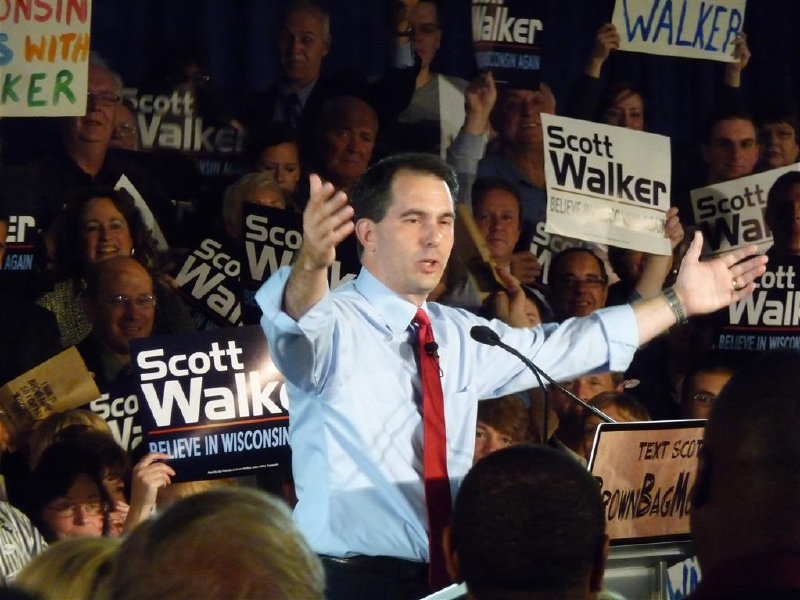If the Republican-controlled Wisconsin Legislature approves Gov. Scott Walker's proposed budget repair bill, which revokes the collective bargaining rights of public employees, the state can surely expect robust legal challenges, according to several labor law experts and attorneys.
Walker's bill would strip all public employees in Wisconsin -- from teachers, nurses and game wardens to snowplow drivers -- of their right to collectively bargain for sick leave, vacation, work conditions or the shifts they work.
A hearing for the bill with the Joint Finance Committee drew protests from thousands of people throughout the state Tuesday, as public employees and their supporters flooded to the Capitol. Many spoke through tears about the need to preserve their rights to negotiate for their futures.
Michael Aldana, partner in the labor & employment group at Quarles & Brady LLP in Milwaukee, said he expects unions such as the Wisconsin Education Association Council (the state's teachers union) and the American Federation of State, County and Municipal Employees (AFSCME) to challenge the law if it is enacted.
"There will absolutely be challenges by WEAC, AFSCME and other unions. There's never been anything like this that happened in this state before. So, I don't know that there's any case law. I imagine the unions in Wisconsin will try to come up with a Wisconsin-specific legal challenge," Aldana said. "I think they'll challenge it on several fronts - equal protection, First Amendment and other types of legal challenges. The unions are going to be looking at every possible angle."
However, that legal challenge will be hard-pressed to find national case precedents to support its cause, according to Keith Bender, associate professor of economics at the University of Wisconsin-Milwaukee.
The rights of private sector employees to pursue collective bargaining are protected by the National Labor Relations Act, Bender said. Public employees are not guaranteed such Constitutional rights by the states, although President John Kennedy signed a law in 1962 to guarantee collective bargaining rights for unions doing business with the federal government.
"No, I don't think there's any constitutional guarantee that even if the state unions want to contest this ... that that's a required right," said Bender, who is not a member of a teacher's union. "The idea is that in the public sector, the (state) legislature has the power of the purse strings. Really, the full power resides with the legislature."
Cheryl Maranto, chair and associate professor of management at Marquette University, agreed that the new law probably will withstand a legal challenge.
"I think legislatively, they probably have the power to do it. Public sector labor law is pretty much the creature of the state legislature," Maranto said.
However, experts say one aspect of the bill could be troublesome for Walker. After the West Allis Professional Police Association, the Milwaukee Professional Firefighters and the Wisconsin Troopers Association donated to Walker's election campaign, he decided to exclude police officers, firefighters and officers of the State Patrol from the bill. In other words, they will retain their full collective bargaining rights, while prison guards, game wardens and others involved in public safety who did not contribute to his campaign, will lose their rights.
"You think there might be a connection there?" Maranto said, laughing.
One other complication could arise with transit workers, such as bus drivers, and other public employees working for agencies that accept federal aid.
According to former Madison Mayor Paul Soglin, federal transportation aid "requires the continuation of collective bargaining rights, and protection of transit employees' wages, working conditions, pension benefits, seniority, vacation, sick and personal leave, travel passes, and other conditions of employment." That means that the state could lose millions of dollars of federal funding if it does not uphold the collective bargaining rights of the affected employees.
Above and beyond the issues of whether the revocation of collective bargaining rights is wise or legal is the morality of the issue, according to some experts.
The right for employees to collectively bargain with their employers is a universally accepted "human right" acknowledged by the United Nations. Article 23 of the U.N.'s Universal Declaration of Human Rights identifies the ability to organize trade unions as a fundamental human right.
"I think it (the Walker bill) is not the right thing to do," Maranto said. "One way to look at it is I hope we consider ourselves a civilized society and a democracy, and we believe in human rights. I do think it is a fundamental human right that is being attacked under the guise of balancing the budget. I don't think that means you have to strip people of a basic right."
Aldana noted the contrast of the bill with Wisconsin's rich progressive history, stemming back to Fighting Bob La Follette.
"This is absolutely unprecedented in Wisconsin. Wisconsin has a long history of being at the forefront in collective bargaining laws. But I'd prefer not to comment on the wisdom of it," Aldana said.
In closing, I give you one other historical item to ponder as we try to put this bill into perspective. On April 3, 1968, Dr. Martin Luther King Jr. traveled to Memphis to support the rights of AFSCME sanitation workers there. That evening, he delivered his famous "I've Been to the Mountaintop" speech to a packed room of supporters. One day later, he was assassinated.
Steve Jagler is executive editor of BizTimes Milwaukee. He dedicates today’s column to the memory of his good friend and trusted colleague, Carol Loretz.
Steve Jagler is executive editor of BizTimes in Milwaukee and is past president of the Milwaukee Press Club. BizTimes provides news and operational insight for the owners and managers of privately held companies throughout southeastern Wisconsin.
Steve has won several journalism awards as a reporter, a columnist and an editor. He is a graduate of the University of Wisconsin-Milwaukee.
When he is not pursuing the news, Steve enjoys spending time with his wife, Kristi, and their two sons, Justin and James. Steve can be reached at steve.jagler@biztimes.com.







